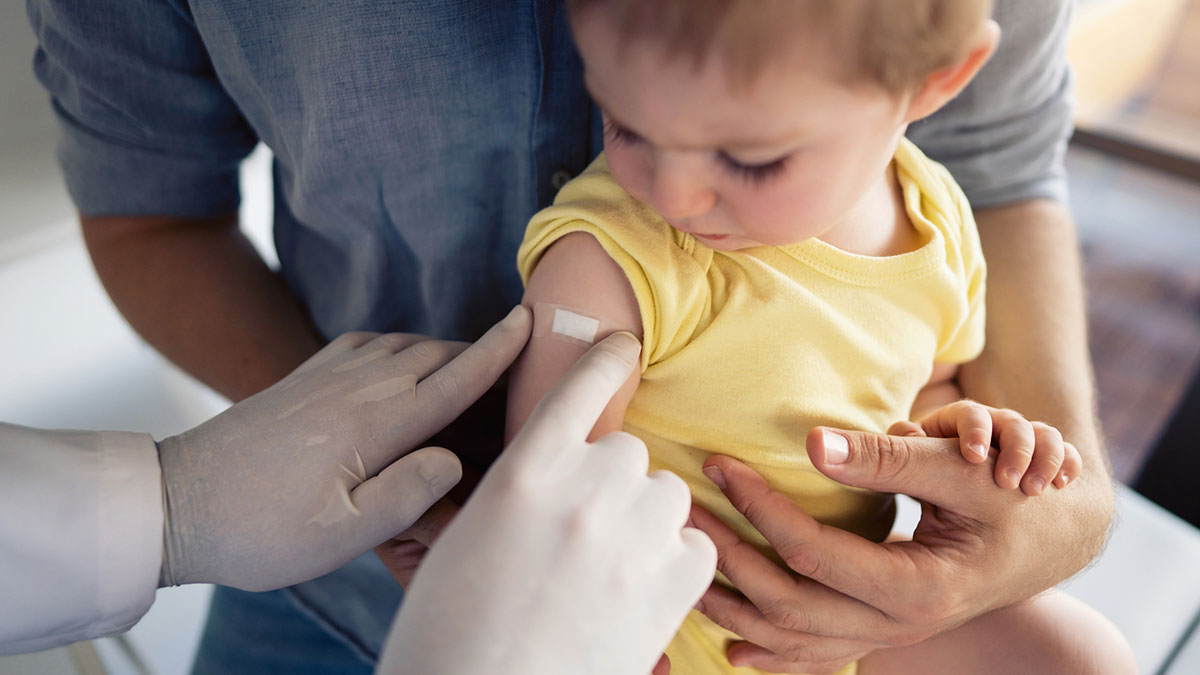Key points
- Measles vaccine is included in MMR vaccine and MMRV vaccine; MMRV is only licensed for children 1–12 years old.
- CDC recommends children receive 2 doses of MMR vaccine.

Introduction
Single-antigen measles vaccine is not available. Measles vaccine is included in these combination vaccines:
- Measles, mumps, and rubella (MMR) vaccine
- Measles, mumps, rubella, and varicella (MMRV) vaccine
This page summarizes CDC's current MMR and MMRV vaccine recommendations by age and risk. Access the official, full text below:
MMR efficacy against measles
Two doses of measles vaccine are 97% (range: 67% to 100%) effective at preventing measles.
One dose is 93% (range: 39% to 100%) effective at preventing measles.
Presumptive evidence of immunity
ACIP recommends that people who don't have presumptive evidence of immunity to measles, mumps, and rubella should get vaccinated against these diseases.
Presumptive evidence of immunity can be established in any of the following ways:
- Written documentation of adequate vaccines for measles, mumps, and rubella
- Laboratory evidence of immunity
- Laboratory confirmation of disease
- Birth before 1957
Although birth before 1957 is considered acceptable evidence of immunity for healthcare personnel in routine circumstances, healthcare facilities should consider vaccinating healthcare personnel born before 1957 who lack laboratory evidence of immunity or laboratory confirmation of disease.
Healthcare providers should not accept verbal reports of vaccination without written documentation as presumptive evidence of immunity.
Routine recommendations
Children
CDC recommends children should routinely get 2 doses of MMR vaccine:
- First dose at age 12 through 15 months
- Second dose at age 4 through 6 years (before school entry)
This can be administered as MMR or MMRV vaccine. Children can receive the second dose of MMR vaccine earlier than 4 through 6 years (as long as it is at least 28 days after the first dose). A second dose of MMRV vaccine can be given 3 months after the first dose up to 12 years of age.
CDC recommends that separate MMR and varicella vaccines be given for the first dose in children aged 12–47 months; however, MMRV may be used if parents or caregivers express a preference.
Adults
Adults and teens should also be up to date on MMR vaccinations with either 1 or 2 doses (depending on risk factors); unless they have other presumptive evidence of immunity to measles, mumps, and rubella. MMR vaccination is especially important for healthcare professionals, international travelers, and other specific groups.
One dose of MMR vaccine, or other presumptive evidence of immunity, is sufficient for most adults. Providers generally do not need to actively screen adult patients for measles immunity in non-outbreak areas in the United States. After vaccination, it is also not necessary to test patients for antibodies to confirm immunity. There is no recommendation for a catch-up program among adults for a second dose of MMR (e.g., people born before 1989 or otherwise).
Considerations for specific groups
Measles vaccine is recommended for vaccinating people in specific groups who do not have evidence of immunity against measles, including:
- College students
- International travelers
- Healthcare personnel
- Close contacts of immunocompromised people
- People with HIV infection
- Adults who got inactivated measles vaccine
- Groups at increased risk during measles outbreak
Post-exposure prophylaxis for measles
People exposed to measles who cannot readily show that they have adequate presumptive evidence of immunity against measles should be offered post-exposure prophylaxis (PEP). Public health officials can help identify eligible persons, assess any contraindications, and weigh benefits.
There are two types of PEP for measles. To potentially provide protection or modify the clinical course of disease among susceptible persons, administer one of these:
- MMR vaccine, if administered within 72 hours of initial measles exposure.
- Immunoglobulin (IG), if administered within 6 days of exposure. The recommended dose for intramuscular immunoglobulin (IMIG) is 0.5mL/kg, regardless of the contact’s immune status.
Don't administer MMR vaccine and IG simultaneously. This practice invalidates the vaccine.
MMR & MMRV contraindications and precautions
Contraindications and precautions to vaccination generally dictate circumstances when vaccines will not be given. Most contraindications and precautions are temporary, and the vaccine can be given at a later time.
Resources
- Vaccine Safety (MMR | MMRV)
- Vaccine Information Statements (MMR | MMRV)
- Immunization schedules (Child and adolescent | Adult)
- Vaccines For Children Program Information for Providers
- Ask the Experts: MMR | Immunize.org
Clinical information
